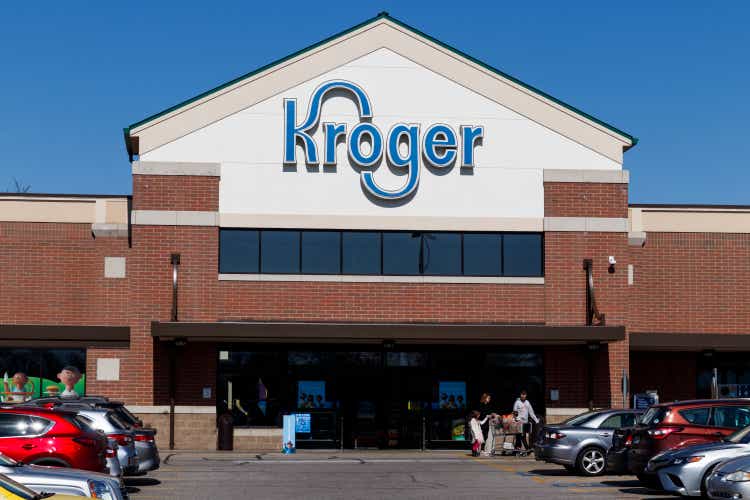jetcityimage
Shares of Kroger (NYSE:KR) have taken a beating as they fell $3 to $43 per share, down 7%, on the confirmation that the company is acquiring smaller peer Albertsons Companies (NYSE:ACI). The anticipated transaction is huge and makes investors a bit cautious as a full (relative) price is paid, while some uncertainty will prevail for a while and leverage will be taken on during an uncertain period of time.
Deal Terms
Kroger has reached a deal to acquire Albertsons in a deal which values its equity at $34.10 per share. The transaction is huge, valuing the company at $24.6 billion, including some $4.7 billion in net debt. There are some moving parts to this deal, which includes a potential special dividend paid out to Albertsons investors, as the purchase price will be adjusted for that, if this were to happen.
Kroger furthermore anticipates that the deal tag will fall a bit as some assets would likely have to be sold to get regulatory clearance to close the transaction. The companies estimate that some 100 to 375 stores will need to be spun off to obtain regulatory clearance.
Greater scale and capabilities are the reason for the deal, as Kroger will become a larger player versus the likes of Walmart (WMT). The company targets to achieve some $1 billion in synergies by year four, of which half are expected to be realized by year two. All of this will take a long time as deal closing is only seen early in 2024, given the timing and time needed to obtain regulatory clearance.
To get a clue about the high-level contribution of Albertsons: the company has more than 2,200 stores, with many of them having in-store pharmacies, generating $72 billion in sales in 2021. From a geographical point of view, Kroger will become much stronger in the Western parts of the country. The deal is set to create a business with $210 billion in sales, $11.6 billion in EBITDA and $3.3 billion in net earnings.
Some Valuation Thoughts
I looked at Kroger as recent as July, when I concluded that it was appearing on my shopping list. The company has seen a strong 2020, for obvious reasons, and after initially guiding for declines in 2021, the company has managed to maintain operating momentum, as this triggered strong share price action as well. After all, shares doubled from $30 per share ahead of the pandemic to $60 in April of this year.
This was driven by strong operational growth as the company posted adjusted earnings of $3.68 per share for 2021, as net debt of $11.7 billion looked pretty manageable given a $7.2 billion EBITDA number. The company guided for 2-3% sales growth this year and earnings around $3.80 per share. With the company maintaining this momentum at the start of the year, an 11-12 times multiple at $45 per share in July started to look compelling again.
Shares rallied to the $50 mark over the summer despite the inflationary environment, as the company posted its second quarter results in September. With inflationary pressures pushing up the organic sales guidance for the year to around 4.0%, or a bit higher, earnings are now seen around $4 per share. Trailing EBITDA is posted at $7.6 billion on a trailing basis as net debt was flattish at $12.4 billion. With 730 million shares trading around the $47 mark ahead of the deal announcement, Kroger was valued at $34.3 billion on an equity valuation, or $42 billion enterprise valuation, that is at $47 per share.
Based on the 2021 results, that reveals that Kroger is valued at 0.30 times 2021 sales at $137.9 billion, and 5.8 times EBITDA of $7.2 billion.
In this respect, the deal for Albertsons looks a bit rich. A $24.6 billion valuation applied to Albertsons values its operations at 0.34 times sales and a similar 5.6 times EBITDA multiple, as Albertsons post slightly higher margins. Assuming an all debt financing, pro forma net debt will jump to $37 billion, that is ahead of potential divestments and retained earnings ahead of closing of course.
With $11.6 billion in pro forma EBITDA, leverage ratios are seen at 3.2 times based on the 2021 results. With some growth in earnings seen this year, deleveraging ahead of the deal closing and synergies, leverage ratios appear quite manageable. The promise is of course that $1 billion in synergies have the potential to add nearly a dollar per share in earnings, that is after full realization of synergies which is only seen in 2028 of course.
And Now?
Shares of Kroger have fallen some $3 in response to the deal announcement and with 730 million shares outstanding, equity valuation of Kroger has fallen some $2.2 billion in response to the deal, being a clear vote that the market does not like the deal a lot.
The companies are still a long way until deal closure. Relative similar/higher multiples and incurring debt in an uncertain environment are all reasons why investors in Kroger are likely cautious. Moreover, Albertsons has had a somewhat turbulent corporate past, albeit that it has seen some fundamental improvements, yet its figures are aided in recent years by the pandemic of course (as the same applies to Kroger as well).
Hence, I understand why investors in Kroger are a bit cautious, as I am too. Nonetheless, long-term value appears to be seen here at around 10 times earnings today, as synergies should be seen if the deal closes, by which leverage should have already come down ahead of the deal closing.


Be the first to comment